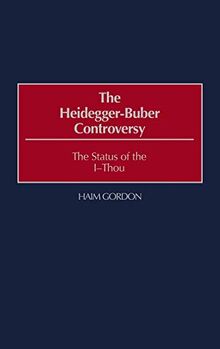
The I-Thou controversy between these two thinkers is a significant but often overlooked issue in philosophy and theology. In one of the first books to truly address the subject, Haim Gordon explores the arguments of both Martin Heidegger and Martin Buber regarding the The I-Thou relationship and its significance for human existence. Gordon's work illuminates Heidegger's complex and enlightening ontology--one that describes the everyday life of the human in such a way that there is no place for the I-Thou relationship. Buber, on the other hand, argues for the significance of the I-Thou relationship within human existence, and highlights the ways in which Heidegger's philosophy fails to grasp this important point. After examining the fundamental ontology of Heidegger, set beside the ontological insights of Buber concerning this relationship, Gordon concludes that each of these important twentieth-century philosophers was guilty of ignoring the contributions made by the other to the study of ontology and being.
By exploring the complicated dynamic between Heidegger and Buber, Gordon presents the reader with valuable insights and a deeper understanding of human existence and relationships. The implications of both this controversy and its resolution are far reaching for many other philosophical disciplines, including social and political philosophy, metaphysics, and ethics.